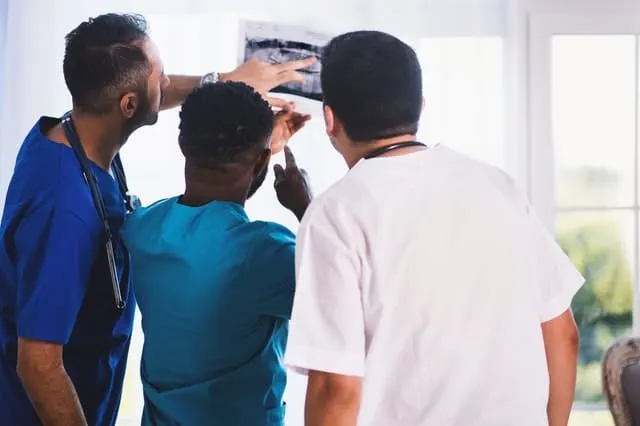
Do you have empathy for victims of assault or abuse and feel strongly that justice should be served? If so, forensic nursing is the specialization for you.
Registered nurses who specialize in treating victims of abuse and sexual assault are called forensic nurses. Forensic nurses play an important role in connecting the criminal justice system with healthcare. They may also have to gather evidence and testify in different court cases.
Like any other profession, forensic nursing has its unique set of advantages and disadvantages. Before we dig deeper into the pros and cons of forensic nursing, it is important to know that some people are drawn to this profession by their passion for helping others. Whereas, some people go into the field just for the sake of job security or money, which doesn’t last very long, or make them happy in the long run.
In spite of the challenging nature of this job, forensic nursing is primarily responsible for providing support to the families of the victims. To become a forensic nurse, you must have specialized skills such as dealing with trauma, compassion, understanding the legal system, etc. While the profession offers many benefits like, multiple career opportunities, higher forensic nurse salary packages, it also poses some challenges.
To understand the profession better, let’s take a closer look at the pros and cons of becoming a forensic nurse.
Advantages to Becoming a Forensic Nurse
The following is a list of some of the top advantages of studying forensic nursing.
- Making a Difference in Someone’s Life
Nursing in the forensic field isn’t just about caring for patients or fighting for their rights; it’s about saving and improving lives. By holding perpetrators accountable and working diligently to keep communities safe, these nurses make a significant impact on survivors.
- Broaden Skills & Flexible Schedules
With intensive forensic training, these nurses have broadened their knowledge of evidence collection, legal investigations, and criminal procedure. Moreover, they work according to a flexible schedule than other nursing positions that majorly require evening work or shift rotation.
The daily tasks of a forensic nurse include preserving and analyzing medical evidence, talking with victims, and creating legal cases, rather than caring for patients at their doctors’ offices or hospitals.
- Higher Salary
In addition to the moral benefits, forensic nurses receive a much higher salary than other registered nurses. For instance, the salary range of a forensic nurse starts from $55,000 to $205,000. A forensic nurse can easily earn anywhere between $27 and $100 per hour or charge around $160 per hour for consulting services. It’s clear that forensic nurses earn much more than standard RNs.
- Specializations & Certifications
There are a variety of certifications or specializations available to forensic nurses, such as child abuse, sexual assault, corrections nursing, elder abuse, and medical examiner investigation. In many cases, forensic nurses become certified as sexual assault nurse examiners (SANE).
Disadvantages to Becoming a Forensic Nurse
As a forensic nurse, you face a number of disadvantages. Some of these are following:
- High Level of Stress & Pressure
As a forensic nurse, you will also observe the dark side of human nature on a regular basis. In other words, violence and trauma will become part of your daily experiences. As a forensic nurse, you are often faced with the feelings of anger, grief, or depression caused by vicarious trauma. The reason is the high level of stress and pressure you experience on the job.
- Heavy Workload and Emotional Burnout
Forensic nursing involves a heavy workload that can include detailed evidence documentation, nursing duties, legal reporting, or the constant pressure to ensure thoroughness or accuracy.
As a result of exposure to traumatic and disturbing cases, forensic nurses often suffer from desensitization and extreme burnout. To deal with such situations, one must learn how to compartmentalize.
- Different Professional Roles
In forensic nursing, professional roles are constantly shifting. When communicating with survivors, patients and their families, law enforcement, healthcare professionals, court officials, and lawyers, a forensic nurse needs to adopt a variety of communication styles. In addition, these professionals need to be meticulous because even a single mistake can severely damage a criminal investigation.
- Physical Demands
The forensic nursing profession is prone to back injuries and foot problems, especially for those involved in typical criminal cases.
A forensic nurse typically works 12 hours a day. However, depending on the case and expected level of accuracy, these professionals might find themselves working up to 16 hours each day. Additionally, the work schedule and physical demands may vary according to seniority.
Final Thoughts
Forensic nursing combines two fields in one — criminal justice and medicine. So, if you think that’s where your true interests lie, or if you can handle constant exposure to human suffering, forensic nursing could be the career for you.
However, if you are considering this specialty, keep in mind that even though it is extremely satisfying to help people, it is also a very draining job. To achieve success in your job, you must give and receive support from your colleagues and find ways to balance your work life with fun, relaxation, and exercise to prevent stress and burnout.
- Sagittarius Man & Gemini Woman Love and Sex Compatibility - January 31, 2024
- Taurus Ascendant Rising Personality Traits in Men (Guide) - January 31, 2024
- How to Seduce and Attract a Sagittarius Man (Seduction Tips) - January 31, 2024
